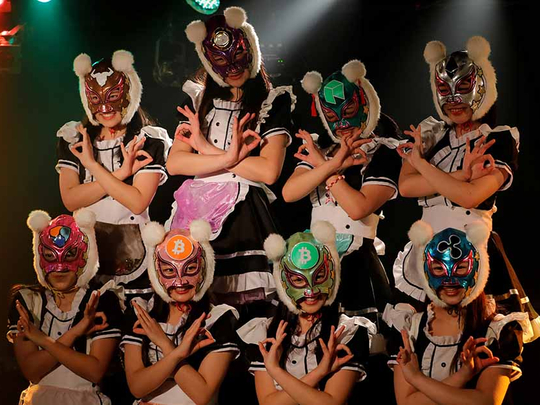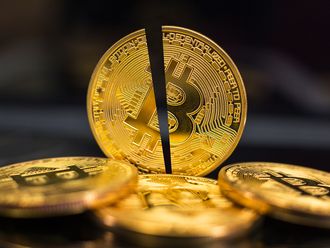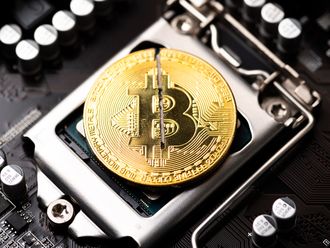
The twists and turns in this crypto-drama make even TV soap operas look dull. On January 8, 2017 cryptocurrency tracker CoinMarketCap pegged the collective market capitalisation of cryptocurrencies at $17.6 billion (Dh64.6 billion). A year later, it had skyrocketed to a jaw-dropping $830.74 billion. The next day, cryptocurrencies started tumbling harder than Humpty Dumpty and, as of February 8, had plummeted to a market cap of $367.67 billion.
These wild swings in virtual fortunes may not affect dirham-holding consumers in the UAE, but their impact is real — and big — in Japan. The country has emerged as the place to go to for all your cryptocurrency needs, especially after the clampdown in nearby China and uncertainty about the government’s stand in South Korea.
The Financial Times reports Japan’s average daily share of the global bitcoin trade is about 40 per cent, “though on some days it exceeds 60”. This is remarkable for a country that was home to the biggest disaster in bitcoin history — the abrupt shutdown in 2014 of the popular Japanese bitcoin exchange, MtGox. That event knocked 650,000 bitcoins out of circulation — which, at its December 2017 peak value of nearly $19,000, were worth more than $12 billion.
Yuzo Kano, CEO of Japan’s leading cryptocurrency exchange, BitFlyer, believes Japan is the “new heart of Bitcoin”. In an in-depth analysis for industry site CoinDesk, he writes that, unlike other countries and their “knee-jerk response” to bitcoin, Japan analysed it and enacted “clear and fair laws” to regulate virtual currency exchanges.
In particular, Japan’s Virtual Currency Act, which came into effect on April 1, declared bitcoin a legal asset and a payment method — but not a legal currency. And in July, Japan removed the 8 per cent consumption tax on bitcoin transactions, opening up the local market to investors from all over the world, especially those from China.
Meanwhile, Japan’s Financial Services Authority was put in charge of regulating the market. As a result, 11 cryptocurrency exchanges were officially recognised in September, with more to come online in 2018. This includes DMM Bitcoin, floated by Japanese entertainment behemoth DMM.
Japanese companies are also getting into other bitcoin-related businesses. SBI Holdings, the financial services arm of SBI Group, has announced it will leverage blockchain tech for a “new financial ecosystem based on cryptocurrency”, while the GMO Internet Group revealed it had entered the crypto-mining business. Masatoshi Kumagai, Founder and CEO of GMO Internet, says, “2017 can be regarded as the year in which cryptocurrency has begun to grow. We expect Japan’s cryptocurrency market will grow and expand further from 2018 onwards.”
Moreover, with the number of wallet users skyrocketing in Japan and globally, Kumagai believes mining will become increasingly important. Interestingly, GMO has offered its 4,000 employees the option of receiving part of their salary in bitcoin. Company spokesperson Harumi Ishii says the organisation wants to improve its “own literacy of virtual currency by actually using it”.
But the biggest support for cryptocurrencies has come from what Reuters calls “Japan’s army of retail investors”.
In a report from December 13, the news agency observed that these investors — attracted by bitcoin’s volatility and the opportunities to make money on arbitrage between exchanges — have emerged as a major force in bitcoin’s “spectacular rally”, accounting for 30-50 per cent of trading in the cryptocurrency. In a recent study, analysts at Japanese financial holdings company Nomura claim that bitcoin alone could contribute an extra 0.3 per cent to Japan’s GDP.
They estimate about 1 million Japanese hold 3.7 million bitcoins. And unlike other parts of the world where investors typically trade in cryptocurrency pairs, in Japan close to half of the bitcoin trading is estimated to be in Japanese yen. This is expected to boost consumer spending by ¥23.2 billion (about Dh778 million) to ¥96.0 billion.
But perhaps the biggest indicator that Japan has truly embraced cryptocurrencies is that the country now has a pop group that croons about, yes, cryptocurrencies. Called the Virtual Currency Girls, each of the eight members of this all-girl band represents a popular cryptocurrency. Japan also has its very own Miss Bitcoin, a 32-year-old Tokyo resident who calls herself a “fan of Bitcoin, entrepreneurship, and technology” and walks the talk by converting all of her disposable income to bitcoin.
Fans like Miss Bitcoin believe cryptocurrencies will continue their upward trajectory, even if there are a few dramatic dips along the way. But not everyone in Japan shares that optimism. When asked about the future of cryptocurrencies at a press conference held on December 21, the Governor of Bank of Japan, Haruhiko Kuroda, replied, “If you look at the charts, it’s clear that the jump is abnormal.”










